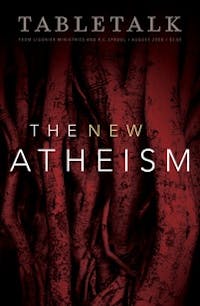
Request your free, three-month trial to Tabletalk magazine. You’ll receive the print issue monthly and gain immediate digital access to decades of archives. This trial is risk-free. No credit card required.
Try Tabletalk NowAlready receive Tabletalk magazine every month?
Verify your email address to gain unlimited access.
For the last four years, I have spoken at a conference on the West Coast called “Resolved.” The name is drawn from the Resolutions of Jonathan Edwards and is aimed at college students and “twenty-somethings” in the next generation. As an eighteen and nineteen year old, young Edwards wrote seventy resolutions, which became his personal mission statement to guide his life. To launch the first conference, I spoke from Edward’s first resolution, what Edwards determined would be the single most important pursuit in his life — the glory of God.
Edwards began his Resolutions with what he desired to be the driving force of his life — an all-absorbing passion to pursue the glory of God. “Resolved: that I will do whatsoever I think to be most to God’s glory and to my own good, profit, and pleasure, in the whole of my duration, without any consideration of the time, whether now or never so many myriads of ages hence. Resolved: to do whatever I think to be my duty, and most for the good and advantage of mankind in general. Resolved: to do this whatever difficulties I meet with, how ever so many and how ever so great.”
With this before his eyes weekly, this first resolution set the tone for his entire life. In every arena, he resolved to honor God supremely. Everything else in his life would be subsidiary to this one driving pursuit.
What is the glory of God? The Bible speaks of it in two ways. First, there is His intrinsic glory, the revelation of all that God is. It is the sum total of all His divine perfections and holy attributes. There is nothing that man can do to add to His intrinsic glory. Second, there is God’s ascribed glory, which is the praise and honor due His name. This is the glory that man must give to God.
For Edwards, to be resolved to live for God’s glory means to exalt His most glorious name. It means to live consistently with His holy character. It means to proclaim and promote His supreme greatness. This is the highest purpose for which God created us.
Why did Edwards place this resolution first? He understood that Scripture places the glory of God first in all things. Edwards was gripped with a transcendent, high view of God. As a result, in writing his “resolutions,” he knew he must live wholeheartedly for this awesome, sovereign God.
Thus, Edwards intentionally chose to “do whatsoever I think is most to God’s glory.” Here is the interpretive principle for everything in life. You want to know what God’s will is? You want to know whom to marry? You want to know what job to take? You want to know what ministry to pursue? You want to know how to invest your resources? You want to know how to spend your time?
There it is! Everything in life fits under this master theme. Anything out of alignment with this principle pursuit is in dangerous territory. Sometimes our decisions are not between right and wrong. Sometimes they are between good, better, and best. These are sometimes the hardest decisions. Edwards said that he would not live for what is merely good. Nor for what is better. He purposed to live only for what is best. Whatever is most to the glory of God — that is what is best!
Edwards believed that God’s glory was inseparably connected with his “own good, profit, and pleasure.” Whenever he sought God’s glory, he was confident that it would inevitably yield God’s greatest good for his life. The glory of God produced his greatest “pleasure.” So it is with us. Would you know unspeakable joy? Abundant peace? True contentment? Then pursue God’s glory.
With unwavering determination, young Edwards chose this first resolution to mark “the whole of my duration.” As long as he was alive, this was to be the driving thrust of his life. He must always live for God’s glory. He would never outgrow this central theme. He must never exchange it for a lesser glory.
Also, Edwards’ believed that his commitment to God’s glory would bring the greatest “good of mankind.” By seeking God’s honor, the greatest advantage would accrue to others. Thus, living for the glory of God would lead to the greatest influence of the Gospel upon the world. Souls would be converted. Saints would be edified. Needs would be met.
Would you have maximum impact upon this world? Would you lead others to Christ? Would you live for eternity? There it is! Live for God’s glory.
No matter what, Edwards resolved to live for God’s glory despite “whatever difficulties I meet with, how ever so many and ever so great.” Regardless the cost, despite the pain, he would pursue God’s honor. Even if it meant persecution or poverty, his mind was made up, his will resolved. He would pay any price to uphold the glory of God, regardless of the hardship that awaited him.
This is my challenge to the next generation: Would you seek the highest goal? Would you know the deepest joy? Would you realize the greatest good? Would you cast the widest influence? Would you overcome the greatest difficulties?
Then make this first resolution of Jonathan Edwards your chief aim. Be resolved to live for God’s glory.
